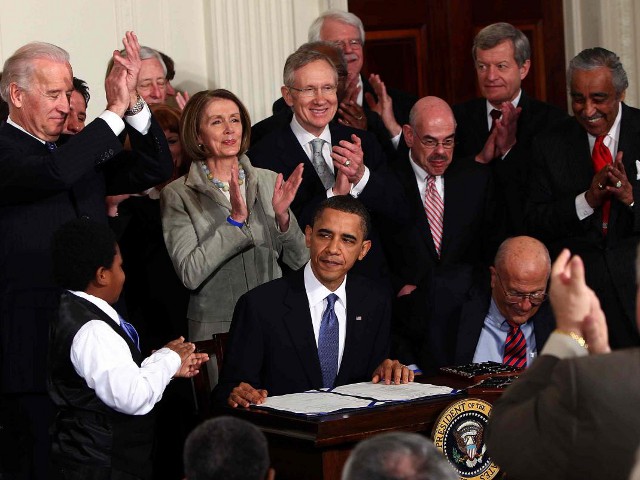This morning, National Public Radio touted its own poll, conducted jointly by Democrat pollster Stan Greenberg and Republican pollster Whit Ayres, by claiming that the majority of voters “favor amending [Obamacare] rather than repealing it.” The poll, which showed Barack Obama with a slim 2-point lead over Mitt Romney (with a 7-point advantage to Democrats in the poll sample), compares the actual Republican position–repeal–with a hypothetical Democrat position that favors “improving” the law. But that is not what Democrats are offering.
There may be some Democrats who oppose individual aspects of the Affordable Care Act–even Elizabeth Warren is running against the tax on medical devices in tech-heavy Massachusetts, for example–and a few Democrats–especially in conservative areas–have talked about “improving” it. However, neither the president nor his party as a whole has adopted a policy of “improving” the law, much less amending it. In fact, the message from the Obama administration is that the law must be implemented immediately in its current form. NPR’s pollsters–bipartisan though they may be–seem to have substituted a more attractive policy in their poll questions.
Here are the exact choices presented to likely voters in the poll, who were asked to favor the “Republican” or “Democrat” position (emphasis added):
The Republican candidate says we should repeal ObamaCare, and replace it with reforms that will specifically address health insurance problems such as stopping insurance companies from canceling policies or denying coverage because of a pre-existing condition. We do not need a massive 2,700 page bill that will lead to a federal government takeover of our health care system.
The Democratic candidate says the Supreme Court has spoken and it’s now time for us to move forward. We should make improvements in the Affordable Care Act, but we must never again allow insurance companies to set lifetime limits if you get sick, discriminate if you have a pre-existing condition, charge more because you’re a woman, or drop young people up to age 26.
On the basis of those questions–the “best arguments” that either party could offer, according to reporter Mara Liasson–likely voters favored the “Democrat” position, 49% to 45%. The “Republican” position that was presented was more elaborate than simple repeal; however, many Republican leaders have actually endorsed the additional goals described in the poll question. The best Republican argument in the poll is one many leading Republicans are actually making. The best Democrat argument is one that is rarely ever heard–perhaps for fear of embarrassing President Obama or pre-empting any new policies he might introduce.
When NPR asked likely voters the simpler question of whether they oppose or support “the health care reform law,” “oppose” was the clear winner, 48% to 43%. Even that was too much for Greenberg to accept. When Ayres pointed out that “the health care reform law is still an albatross around the president’s re-election campaign,” Greenberg interjected: “No, no, no, no, no. This poll, in fact, undermines the conventional wisdom…what we have here is almost an even split on health care. It’s lost much of its intensity.”
That might be what Democrats want to believe–and certainly President Obama is reluctant to talk about it. But it remains an intense issue, and a winning one, for Republicans–not just on its own but because it touches crucial economic, social, and constitutional issues.

COMMENTS
Please let us know if you're having issues with commenting.